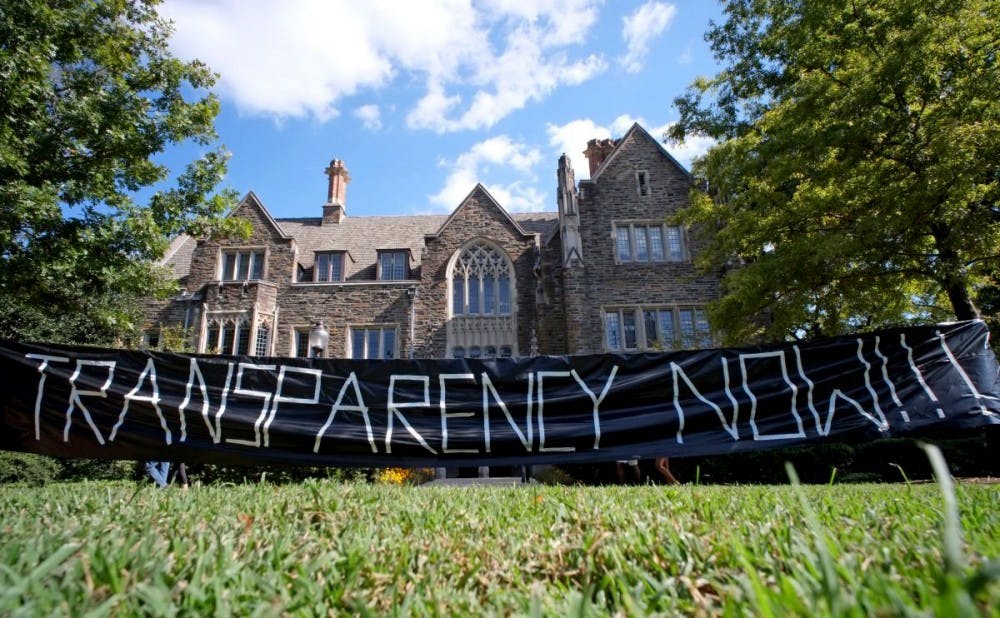Duke’s Advisory Committee on Investment Responsibility recently recommended that the University not disclose the contents of its endowment’s investment portfolio.
In a Sept. 21 letter from James Cox, Brainerd Currie professor of law and ACIR chair, to President Richard Brodhead, the committee responded to the now-defunct student group DukeOpen’s request for greater endowment transparency. ACIR cautioned against the “broad disclosure of the endowment’s investment holdings” due to the potential adverse effects of “reducing competitive advantages and jeopardizing existing relations with advisors.” Students, however, are not convinced that the committee’s decision stands up to scrutiny.
“We should be hugely suspicious of any efforts to stack the deck against the ability of the community to engage in its self-governance,” said Bobo Bose-Kolanu, the founder of DukeOpen and a fourth-year graduate student in literature.
In 2004, the University’s Board of Trustees crafted the Guideline on Socially Responsible Investing, which instructed Duke to balance being a “good corporate citizen and a responsible and ethical investor” with maximizing financial returns for the University. After multiple protests by DukeOpen, the Board of Trustees modified Duke’s endowment policies at its October 2013 board meeting. Among the changes approved by the Board were regular ACIR meetings, a public forum and the creation of a social choice fund—an account within the endowment dedicated to socially responsible companies—which donors can opt into.
ACIR’s next open forum will take place at 6 p.m next Monday in Rubenstein Library’s Holsti-Anderson Room.
Would transparency really help?
Instead of disclosing the endowment’s holdings, ACIR’s report recommended “periodic engagement of the Duke community”—offering the open forum as an example—as well as continued “productive dialogue around investment responsibility.”
Cox said students and community members can make compelling arguments with regard to social responsibility without knowing the University’s exact investments, simply by being proactive.
“If they know a company they don’t want to invest in, then they can offer reasons why they don’t want to,” he explained. “Why do they need to know whether we own it? Why do you need to know the company to identify the issue?”
Bose-Kolanu, however, described this policy as “disingenuous” and said that it puts student groups at a distinct disadvantage.
“Specific arguments are best,” he said. “If the person making the proposal is robbed of the specifics of the scenario, then they cannot write their strongest proposal or produce their strongest research. That’s tailor-made to have this committee rubber-stamp rejections.”
Even if the University were to start disclosing investments, it could only disclose its direct holdings, which only make up approximately 1 percent of the investment portfolio, said Michael Schoenfeld, vice president for public affairs and government relations. The other 99 percent are indirect investments—often made through hedge funds—and would be difficult to disclose for legal reasons such as confidentiality.
The frequently changing character of Duke’s investments means that disclosing the University’s holdings would not be of significant benefit to students, Cox said.
“Unless you know every day what the energy holdings would be, you don’t know whether they’re low on the 30th and then they loaded up on July 1,” he explained. “Students are not going to be that nimble to go in everyday, even if it were available.”
Financial risks of disclosure
ACIR’s letter compared Duke’s disclosure practices to those of five other unnamed universities, and found that Duke’s practices were consistent with all but one with regards to “not releasing information regarding specific investments.”
Revealing the University’s holdings would also diminish Duke’s financial returns by inspiring other universities to take advantage of the same investments, Cox said.
“There are a lot of institutions that would love to be able to do as well as Duke does with its investments,” he noted. “We’re consistently in the top five, and so you worry about the copycat behavior. These are competitive institutions.”
Bose-Kolanu said that this position is inconsistent with comments made by Neal Triplett, president of the Duke Management Company—which manages the endowment—in a Sept. 20, 2013 meeting with DukeOpen.
“Do I think [other universities] could reverse engineer what we’re doing? Probably not. If you do that [disclosure] in a controlled environment, the chances are pretty low,” Triplett is quoted as saying in a 2014 Chronicle guest column Bose-Kolanu wrote.
Triplett, however, wrote in an email that the quote “does not accurately reflect my views,” and Schoenfeld added that Duke’s policy of non-disclosure has remained consistent.
The one university referenced in ACIR’s report that does disclose the names of companies in which it has direct investments follows a “fairly strict protocol,” which includes restrictions on note-taking, photography and viewing location when the records are accessed.
Bose-Kolanu pointed to this example as a reason why Duke has failed to justify a blanket non-disclosure policy.
“It’s really hard to make a compelling argument that after years of a comparable institution doing responsible disclosure and not experiencing negative results, that the sky will fall down if we do this,” he explained. “People should be a little more skeptical when hearing these arguments from the administration.”
Ultimately, what Bose-Kolanu said he would like to see is compromise with the administration to protect both the community and the University’s interests, citing trailing disclosures and disclosure under limited reading conditions as possible examples.
“There are ways to do disclosure that limit the possibility for damage to returns while allowing sufficient oversight for community involvement,” he said.
Get The Chronicle straight to your inbox
Signup for our weekly newsletter. Cancel at any time.

